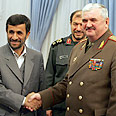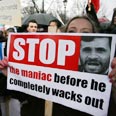A military attack on Iran could unleash disastrous consequences for the Middle East and the wider
world, a coalition of unions, faith groups and think tanks warned in a report released Monday.
The document, "Time to Talk," said a military strike, which many believe is being planned by the United States, could further destabilize neighboring Iraq, undermine hopes for Israeli-Palestinian peace and embolden hard-liners in Iranian President Mahmoud Ahmadinejad's government. It said an attack on oil-rich Iran could also drive up fuel prices, harming economies around the world.
"The possible consequences of military action could be so serious that governments have a responsibility to ensure that all diplomatic options have been exhausted," the report said. "At present, this is not the case."
The report was compiled by 17 groups, including the Amicus and GMB trade unions, aid agency Oxfam, the Muslim Council of Britain and the Foreign Policy Centre, a left-leaning think tank. Among the document's backers is Sir Richard Dalton, British ambassador to Iran between 2002 and 2006.
Dalton acknowledged the threat posed by Iran's nuclear ambitions, but said "recourse to military action - other than in legitimate self-defense - is not only unlikely to work but would be a disaster for Iran, the region and quite possibly the world."
He urged the United States to show "firmness, patience and a commitment to diplomacy" in dealing with Iran.
The United States and several Western allies believe that Iran is using its nuclear program as a cover to produce atomic weapons - a charge Iran denies, saying it seeks only to generate electricity. Last week a respected think tank, the International Institute for Strategic Studies, said Iran was likely two to three years from having the capacity to build a nuclear weapon.
Monday's report did not reach a conclusion on whether Iran intended to build nuclear weapons, but acknowledged that "many members of the international community are deeply concerned" about Tehran's intentions.
'Iran should be wary of dangers'
The UN Security Council has imposed sanctions on Tehran, and threatened to impose more if it continues to refuse to roll back its nuclear program.
The US government has refused to rule out military action, and has beefed up the US military presence in the Gulf. President George W. Bush has used increasingly aggressive rhetoric, accusing Iran of training and arming insurgents in Iraq and vowing a tough response.
The report urged the British government to press for direct negotiations between Iran and the United States and for a compromise on the demand that Iran suspend uranium enrichment as a precondition for talks.
The report is one of several high-profile appeals for a diplomatic solution to the crisis. In a letter published in the Sunday Times newspaper, three former high-ranking US military officers urged the US to open talks "without preconditions" with the Iranian government.
Retired Lt. Gen. Robert G. Gard, retired Marine Gen. Joseph P. Hoar and retired Vice Admiral Jack Shanahan said an attack "would have disastrous consequences for security in the region, coalition forces in Iraq and would further exacerbate regional and global tensions."
The Observer newspaper reported Sunday that Labour Party lawmaker Nick Brown, a former minister in Prime Minister Tony Blair's government, would file a House of Commons motion this week calling on Blair to speak out against military action.
Blair has refused to rule out a military option against Iran, and his office on Sunday declined to say whether the prime minister would back military intervention.
The report said that an attack by the US or its regional ally, Israel, could spur more violence in Iraq from
Iran-linked Shiite insurgents. "Iran's links with Hizbullah in Lebanon, Hamas in the West Bank and Gaza as well as Shia constituencies in Iraq, Afghanistan and the Gulf States make regional retaliation against any military attack on Iran likely," the report said.
"UK forces in Iraq and Afghanistan could be particularly vulnerable, with significant losses possible."
An attack could also increase terrorism by fueling anti-Western sentiment around the world, while strikes on nuclear facilities risk unleashing radioactive contamination, the report said.
Ali Ansari, director of the Institute of Iranian Studies at St. Andrews University in Scotland, said both sides needed to step back from the brink.
"The view held by some in Washington that all diplomatic and political options have been exhausted is a palpable nonsense that needs to be challenged," he said. At the same time, "The Iranian government needs to recognize the danger it faces."

















